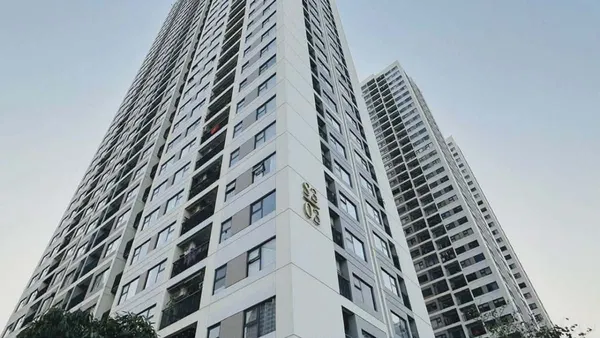 Business Beat
Business Beat

Will consumer loans remain a money-spinner for banks post-COVID-19? This was a question recently posed by market observers after witnessing the pandemic’s big economic impact on individuals and households, dragging down demand for personal loans.

|
The ratio of consumer credit to total credit in Việt Nam is just around 20 per cent, meaning there is a lot of room for growth. — Photo hanoimoi.com.vn
Compiled by Thiên Lý
Will consumer loans remain a money-spinner for banks post-COVID-19? This was a question recently posed by market observers after witnessing the pandemic’s big economic impact on individuals and households, dragging down demand for personal loans.
This has had an impact on banks’ profits.
But experts said consumer finance would remain lucrative for lenders though they must have products that meet the market requirements and the Government must have stimulus measures to boost consumption.
They said companies and individual consumers’ demand for finance is recovering and is expected to grow strongly after the pandemic ends.
But to grasp this opportunity, finance companies must review their business strategies, giving priority to development of technology platforms to ensure manual work is reduced to cut costs and thus reduce loan interest rates to attract borrowers.
The question about the personal loan market’s potential after the pandemic ends leads to another: can it attract investment?
Việt Nam’s population is expected to reach 100 million in 2025, according to the Institute of Public Policy and Management. Dmitry Mosolov, general director of Home Credit Vietnam, said the market potential is hence very high especially since the country’s GDP is the second highest in Southeast Asia and 70 per cent of its population is of working age.
According to Hong Leong Bank Vietnam, Việt Nam’s GDP growth rate is high and sustained, leading to a rapid increase in personal incomes and growth of the middle class, key factors in fostering consumer credit growth.
The ratio of consumer credit to total credit in Việt Nam is just around 20 per cent, meaning there is a lot of room for growth.
But demand for loans for buying consumer goods is expected to continue increasing sharply in the coming years.
Nguyễn Hoàng Minh, deputy director of the State Bank of Việt Nam’s HCM City branch, said in 2016-18, the annual growth of outstanding loans for finance and consumption was 36 per cent on average.
He forecast the high growth rate to continue, saying this has attracted finance companies and banks to the market.
Concurring with him, experts said consumer finance is always attractive to both domestic and foreign banks and finance companies since its profit margins are higher than from other loans.
This is evidenced by the impressive growth of consumer finance companies in Việt Nam like FE Credit, Viet Credit, SHB Finance, Easy Credit, and others.
Because they are not constrained by stringent regulations, they can do business more easily than banks, which find it hard to flourish in the consumer loan market.
Banks have gone down the route of establishing finance companies.
FE Credit, a consumer finance company owned by VPBank, has accounted for 50 per cent of the bank’s overall profits in recent years. HD Saison, the consumer lending arm of HDBank, accounts for a third of its profits.
For borrowers, though they have to pay higher interest rates, the benefit is that they do not have to provide collateral or go through tortuous procedures.
The experts said tapping the market’s potential depends much on the Government’s policies for it.
The Government should be more open to new credit models, including digital credit, but have a proper legal framework to effectively regulate them.
After the pandemic, digital business models are developing strongly in Việt Nam, and digital lending too would benefit, the experts said.
But rapid growth is often accompanied by subversions of the system, something for which authorities should keep their eyes peeled.
Housing prices remain high despite COVID-19 effect on economy
A report from the Ministry of Construction says liquidity has fallen sharply in the real estate market since the COVID-19 pandemic broke out.
In the first quarter, there were 13,042 real estate transactions, meaning only 14 per cent of the products offered for sale was bought.
This was the lowest rate in four years and equivalent to only 40 per cent of the number in the same period last year.
In Hà Nội, there were 1,167 transactions, or 38 per cent of the number from just the previous quarter.
HCM City saw 2,816 successful transactions, equivalent to 55 per cent of last year’s Q4 figure.
Yet, prices have remained on an upward trend.
In Hà Nội, apartment prices were 1.02 per cent up from a year earlier, while those of detached houses were up 3.82 per cent.
In HCM City, apartment prices were up a whopping 3.5 per cent. High-end apartment prices rose by 2.75 per cent.
Industrial properties saw the highest price increase, an estimated 6.2 per cent, while prices of tourism properties were unchanged.
The intriguing question is why the prices increased despite a lack of demand.
Nguyễn Thanh Tuyền, chairman of BHS Property Joint Stock Company, said in the last two years supply has been limited because property developers face numerous legal difficulties and have been unable to bring products into the market.
The momentum in the price rise as a result of lack of supply continued into the first quarter, he suggested.
Nguyễn Thế Diệp, chairman of Hưng Thịnh Phát Investment Joint Stock Company, said Việt Nam is now at peak urbanisation and so housing demand is huge, but development of property projects in major cities like Hà Nội and HCM City is very slow due to the need for inspections by multiple agencies.
In HCM City, for instance, in the first quarter only 10 housing projects entered the market with 2,736 apartments, or only 58 per cent of the number in the previous quarter.
The CEO of a housing development company in HCM City said the main reason for prices to rise is the increasing costs.
For instance, the Government’s land use fee now is almost equivalent to market prices, he said.
A study by the Ministry of Construction found that land prices now account for 20-25 per cent of the cost of housing, and increasing land prices are pushing up the selling prices of housing, he said.
Besides, most developers do not want to cut prices since it would affect their prestige, he said.
So they have to take recourse to promotion programmes to stimulate the market while not touching the prices, he said.
Nguyễn Văn Đính, vice chairman of the Việt Nam Brokers Association, said in the first quarter most transactions were in the medium- and low-priced segments, where there is a chronic shortage of supply, and so prices hike despite the low demand.
The ministry’s report said the property market has not been severely affected by the pandemic though there has been an impact on some segments. VNS




